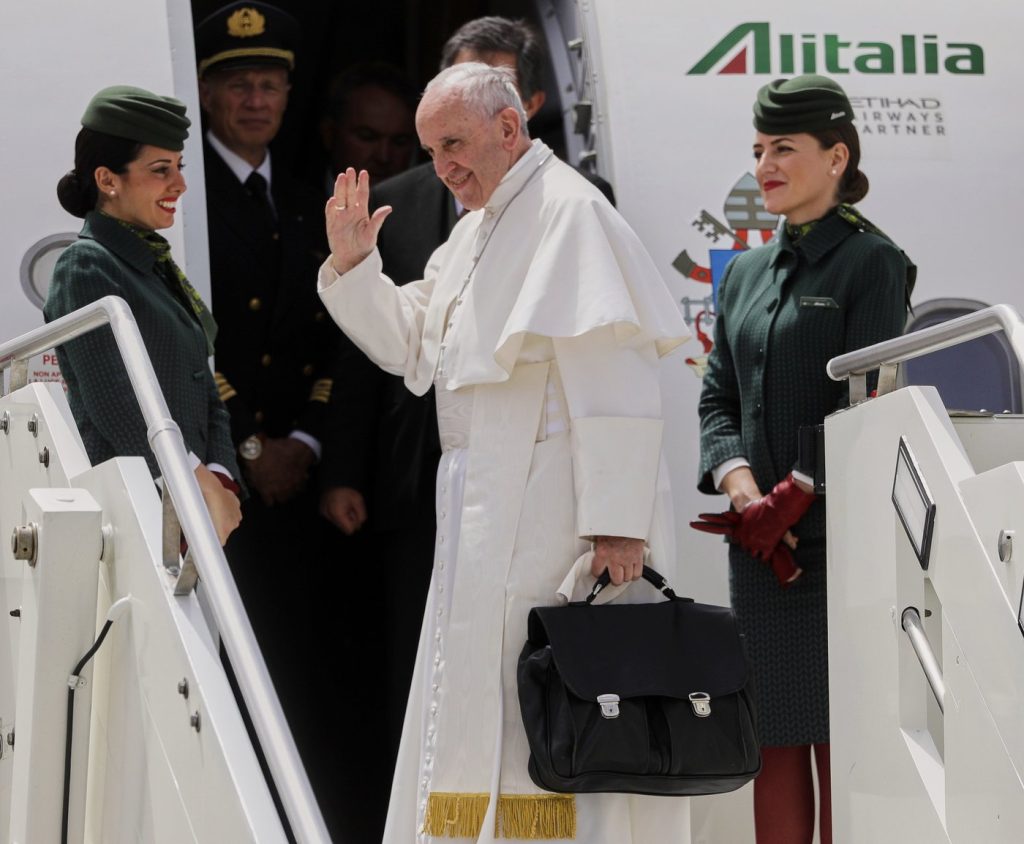During his inaugural foreign trip in 2013, Pope Francis captured significant attention when he chose to carry his own black leather briefcase while boarding an Alitalia charter to Brazil. This act was particularly noteworthy as popes traditionally do not carry bags, harking back to a time when they were literally carried on thrones until the 1970s. When queried about the contents of the bag, Francis humorously remarked that it didn’t contain nuclear codes, expressing his bewilderment at the attention given to such a commonplace action. “I have always taken a bag with me when travelling – it’s normal,” he stated at his first news conference as pope, emphasizing a desire for a return to normalcy in the papacy and in life.
Over the span of more than a decade, Pope Francis has consistently sought to embody this normality through his informal demeanor and preference for simplicity, all the while exercising the considerable authority inherent to his position as Christ’s vicar on Earth and Europe’s last absolute monarch. His recent five-week hospitalization for pneumonia has mirrored this approach; he has kept the public informed of the typical struggles faced by an 88-year-old man battling a complex lung infection via regular medical updates, all while efficiently managing the affairs of the Catholic Church, which boasts a following of approximately 1.3 billion members.
Throughout his hospitalization, Pope Francis has maintained his control over church operations. Aside from engaging in prayer and physiotherapy, he has made significant appointments, including appointing more than a dozen bishops, endorsing several new saints, and approving an extension of a critical reform process by three years. Vatican cardinals have filled in for him at public events requiring his presence, demonstrating the delicate balance of power he navigates, especially in times of illness.
As the only individual with recourse to the supreme, full, immediate, and universal ordinary power per church canon law, Francis typically answers solely to God, with no appeals against his rulings. While popes are not subject to re-election or no-confidence votes, they owe their positions to the 120 cardinal electors. Although these cardinals pledge obedience to the pope, they will ultimately select his successor from among themselves. Consequently, discussions regarding papal contenders, potential conclaves, and challenges that may arise for a future pope have surged among Roman circles since Francis was admitted to the Gemelli Hospital on February 14.
Pope Francis is acutely aware that every hospitalization ignites speculation about his successor, contributing to a sense of being a “lame duck.” After a previous hospitalization in 2021, he remarked that “some wanted me dead,” as he became aware of clandestine meetings intended to strategize for the next conclave. Moreover, prior to his current hospitalization, rumors circulated about an anonymous cardinal who had circulated a seven-point memo outlining the priorities for the next pope to rectify the “confusion, division, and conflict” that critics claim Francis has fostered.
Despite the pressures and expectations surrounding his leadership, Francis has approached his vulnerabilities with transparency, a stance that contrasts with typical public figures who may fear that any sign of weakness could undermine their authority. Early in his papacy, he invited Argentine doctor and journalist Dr. Nelson Castro to explore the health conditions of popes, including his own, showing a keenness to portray himself as relatable rather than saintly. Castro observed that Francis openly discussed both his physical ailments and mental health challenges, including consulting a psychiatrist during the military dictatorship in Argentina, illustrating his humanization amidst the aura of power.
The Rev. John Cecero, a former Jesuit provincial, noted that Francis’ readiness to share his weaknesses while exercising absolute authority reflects his Jesuit training and echoes biblical teachings, specifically St. Paul’s assertion that “when I am weak, then I am strong.” Cecero highlighted humility as a core virtue among Jesuits, guiding their leadership toward the collective good rather than self-interest. However, critics of Pope Francis often describe him as authoritarian and accuse him of making unilateral decisions and exercising power with an iron fist, as articulated in the book “Dictator Pope,” penned by a traditionalist adversary early in his papacy.
As discussions surrounding Pope Francis' health and potential absence from duties gain momentum, there is an acknowledgment that his authority persists even if his public appearances become limited. Kurt Martens, a canon lawyer at the Catholic University of America, reminded observers that the historical precedent exists for popes being absent for extended periods, and Francis continues to maintain control and lead the Church despite these challenges.
Recently, doubts surrounding the authenticity of the sole photograph of Pope Francis released since his hospitalization were raised, showcasing him from behind as he prayed in his private hospital chapel. Avvenire, the newspaper affiliated with the Italian bishops’ conference, asserted that this image effectively represented Francis' desire to shape the public's perception of his papal role amid illness, urging the faithful to focus on spiritual matters rather than the spectacle of a frail pope.










